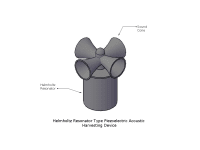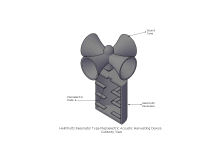Sound in the form of noise is generally present everywhere we go. It may range from a library-like conversation to a sound of a jet taking off. However, this “noise” dissipates into our environment and without it being utilized at all. Energy in the form of mechanical vibrations, by which sound is governed, can be converted into electrical energy. The Helmholtz Type Piezoelectric Acoustic Harvesting Device (HRTPAHD) is designed to convert these noises into useful electrical energy to power devices. It works by collecting the sound waves into its sound cone and into the Helmholtz resonator. Sound travels inside the resonator and causes it to vibrate. The attached piezoelectric plates on the inside wall of the resonator will be forced to vibrate as long as sound continues to enter. Vibrations of the piezoelectric plates induce the production of electricity in the plates as described by the piezoelectric effect. The produced electricity is sent to a rectifier circuit and then stored in a battery for consumer use.
HRTPAHD is aimed for use in urban areas, airports, passenger terminals, industrial areas, engine rooms in ships and even spacecraft launching sites, due to the high noise density. If HRTPAHD will be structured in an array, it can be used as a noise reduction wall at the same time it produces energy. Such a structure can be used on railroads, airports, industrial plants and launch sites. The energy produced by the HRTPAHD can be used to power autonomous systems such as parameter monitoring devices, wireless security devices, emergency lighting, back-up power supply and can also be used as charging ports for devices in public areas. With the idea of autonomous systems, it will significantly reduce the costs of replacement of batteries for devices and maintenance costs.
HRTPAHD has high market potential due to its low cost with regards to its material and manufacturability. Parts can be molded using HDPE and can be assembled with particular ease. The piezoelectric plates can be fixed through pre-molded slots in the cavity for easy assembly. The design idea is fairly new in the market. In comparison to solar panels, HRTPAHD has lower costs but does not compromise the output energy it can give. With HRTPAHD, we can revolutionize the way we think about noise.
Like this entry?
-
About the Entrant
- Name:Cris Gino Mesias
- Type of entry:individual
- Software used for this entry:Autodesk AutoCAD
- Patent status:none








